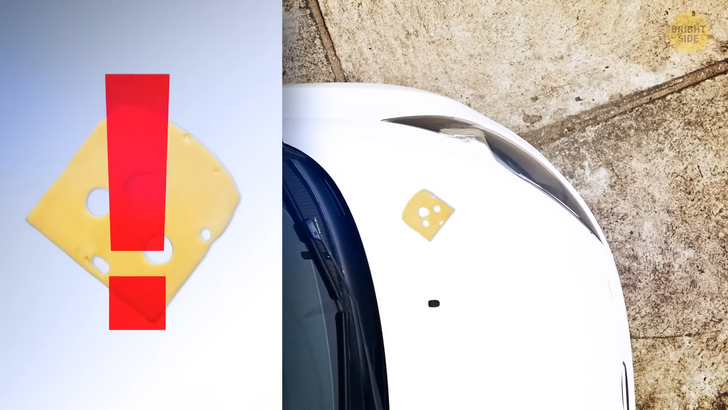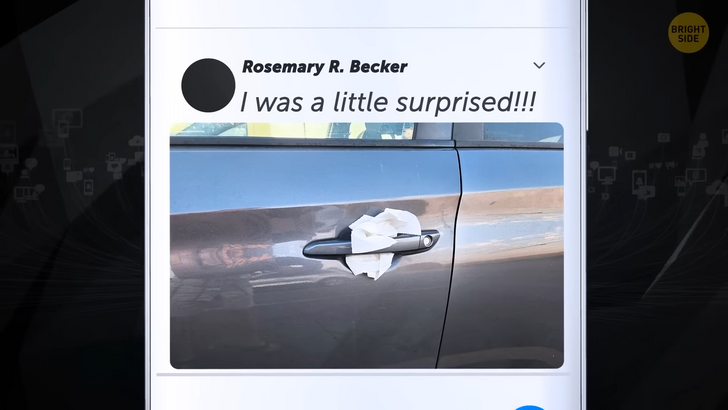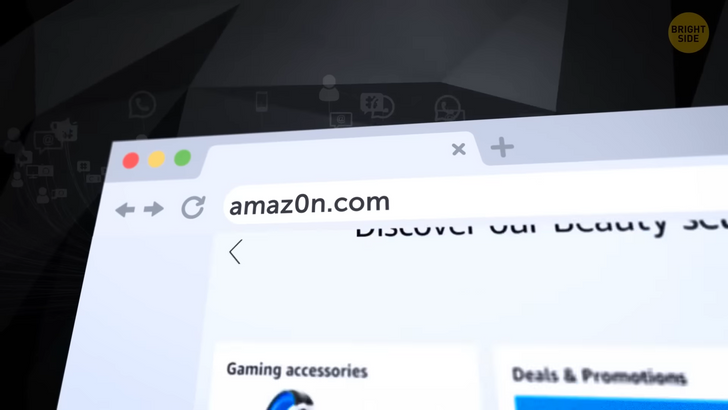I Refuse to Keep Paying for My Sister’s Lavish Life—I’m Not Her Free ATM


A slice of cheese isn’t something you’d expect to find on your parked car. As hilarious as it seems, it might indicate something quite dangerous! One woman detailed such a story online.

At first, she just thought she had been pranked by some neighborhood kid. She decided to call a friend and ask for help with cleaning the car. But once the two ladies started removing the melted cheese, they noticed something strange two parking spots down from them.
They remembered seeing a white van arriving. In it, there was a bunch of men staring at them. Since she wasn’t alone, the woman decided to finish cleaning the car, even though the ladies didn’t feel comfortable being watched. It took them almost an hour to scrape off the cheese that had already melted under the heat of the sun.
She did wonder, though, if this wasn’t a tactic to rob a person. Because most people would be so focused on cleaning up the mess on their car that they would be too distracted to keep an eye on their belongings. Or worse, what if it was a kidnapping strategy since you wouldn’t be able to see suspicious people coming at you in due course?
She went on to recommend: if you ever see a piece of cheese on your car, just leave it. Your safest bet is to scrub it off at home. Or take your vehicle to the nearest car wash. They’ll know the best way to remove it without ruining the paint.

The slice of cheese may have easily been a coincidence. But some scams out there are even more imaginative. If you notice a piece of clothing on your windshield or wrapped between your wiper blades, don’t hurry to take it away. Again, it can be strategically placed there to distract you while your car gets taken away.
The best option is to drive away as quickly as possible and get to a safe location — it should be well-lit and populated. Then you can safely remove the objects placed on your car. Some people have even found money under their wipers. It was probably placed there with the same intent in mind.
Here’s a method some people swear by when it comes to decreasing the odds of getting your car snatched away. Keep the tires turned toward the curb when parked. That’s because when your car wheels are positioned like that, thieves are less likely to be able to maneuver the vehicle. This way, your car will require more time and energy to be moved. And it will less likely become the focus of theft.

Another woman remembered finding a napkin under her car door handle at one point. But at that time, she didn’t think much of it. She removed it and went on with her day. However, a couple of hours later, she ended up in a hospital, complaining about pain in her hand and shortness of breath. Doctors figured out she had been poisoned with an unknown substance!
Unfortunately, scams are becoming more and more common these days, with online ones topping the list. You may be the subject of a phishing scam, for example, when you receive an email from someone who seems familiar. It might be your accountant, someone from work, or a retailer you often buy from.
But if you look closely at the email address, you’ll easily notice that something is off. It might be just one edited letter or a name spelled differently. These types of emails can ask various things from you. Anything from private information, such as addresses and passwords, to payment requests.
Others offer coupons or gift cards — if you click on a certain website, it may actually hack your computer. This is probably the most common online scam these days. Authorities claim that over 114,700 people fell victim to it in 2019. Their losses were estimated at roughly $57.8 million!

Then there are fake shopping websites. To make sure you’re always on the right one, check the URL carefully. If the website reads Amaz0n.com, you’re obviously not in the right place, and you are probably about to get scammed. You can buy something from these websites, but the chances are you’ll receive either nothing or — the best-case scenario — a fake item.
Ever heard of formjacking? It happens when a retailer gets hacked. And once you’ve finished adding things to your cart during a shopping session, you’re actually redirected to a fraudulent payment page. The scammer then has access to your payment information, like your name, address, and credit card details. To always be on the safe side, double-check the URL of the payment page before entering any sensitive information.
Tech support scams are even more creative. With this one, you might even receive a phone call saying that your computer is infected with a dangerous virus which may damage your device or destroy all the information stored on it. The scammer may then ask you to download an application that will give them access to your computer, even if they’re located on the other side of the world. Then they’ll download an actual virus on the computer to confirm their lie. It makes people think there’s indeed something wrong with the computer.

The next and final step? Asking for a fee to fix it. If you suspect your device might be compromised, always reach out to a trusted tech support or retailer. These types of businesses will never contact you out of the blue. This scam tends to appeal to people’s emotions, targeting mostly the older generation.
That’s why it’s also dubbed “the grandparent scam.” The targeted senior will most likely receive a phone call from a distressed person, claiming they’re a grandchild or a close relative. The fraudster will then proceed to ask for money for various things, like to get out of jail, to be able to leave a foreign country, or to cover a hospital bill.
Grandparent scams are really on the rise these days: in 2017, the losses from such scams added up to $26 million. But in 2018, they almost doubled, reaching $41 million! If you find yourself in a similar situation, try not to act immediately. Ask the person for some information that could help you verify their identity. Also, it might be a good idea to double-check with another family member before sending money to a stranger.

The Google voice scam is as easy as it is efficient. For scammers, of course. Here’s what you should look out for. You might have posted your phone number on some website for various reasons: maybe you’re looking to sell something or offering to perform a service. The fraudsters will pick up on this information and rapidly call you, asking to verify if you aren’t a scammer yourself — talk about reverse psychology!
You’ll be asked to pass on a Google verification code. In reality, a Google Voice account is being set up in your name. Fraudsters can go on with their scams and pretend to be you while doing it, using the newly created account. Rule number 1: never share verification codes with anyone! Online resumes aren’t safe either, as they can offer personal information to scammers.
They will try to contact you, pretending to be recruiters. Some might even take the time to conduct a job interview! Most of them pretend to offer high-paying positions, which you’ll obviously be inclined to accept. But here’s the catch: before they can offer you the documents for employment, you’ll be asked for money for some participation fee or even for your future home-office setup.
To make sure you’re always on the safe side, create a different email address which you’ll only use for job hunting. This way, you can keep your personal email unlisted and safe from any unwanted online scams. Always ask recruiters to confirm the information you’ve heard on the phone via email too. If it’s a company you’re familiar with, you can also reach out to their HR department to confirm that what you’re asked to do is according to their policy.











